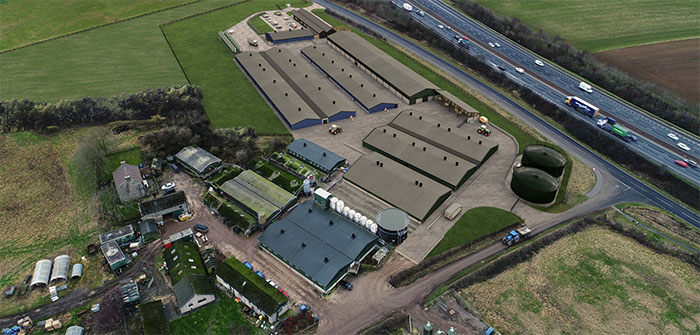The National Pig Centre, which opened today at the University of Leeds, will enable scientists to provide new insights for the pig industry, including precision nutrition and 24-hour monitoring.
Scientists from a range of disciplines at the University will use new facilities to help improve the sustainability and efficiency of pig production. Supported by more than £11 million investment, the facilities make Yorkshire one of the best places in Europe for pig research.
Professor Lisa Collins, academic lead for the PigSustain projectand head of the University of Leeds’ School of Biology, said the National Pig Centre will be a leading research facility for pig nutrition, behaviour, health and production system research – all themes identified by the livestock industry as central to improving quality, productivity and future competitiveness.
Professor Collins, said: “This new centre allows us to expand our work to improve the welfare of pigs, and the sustainability of the British pig industry.
“Our aim is to lower the environmental footprint of pig farming whilst ensuring that high welfare standards are maintained.”
The new centre will benefit from academic expertise drawn from across a range of disciplines including nutrition, health, behaviour and fertility, as well as computer vision, engineering, soil and water sciences, data analytics, and atmospheric and climate science.
It has been launched in partnership with the Centre for Innovation Excellence in Livestock (CIEL), which has invested £4.5m, with funding from Innovate UK, the UK’s Innovation Agency.
The investment includes a three-fold increase in the previous capacity of the farm, from 200 to 660 sows; of these, 220 will live outdoors.
The combination of an outdoor sow unit with an indoor system is unique in Europe, enabling direct comparison of the different rearing systems.
Academics will work to identify the key factors contributing to pig farming’s environmental footprint and attempt to find alternatives that could drive down the sector’s greenhouse gas emissions.
The indoor facility is equipped with CCTV throughout, permitting round the clock observations of individual pig’s behaviour at all stages of production. Researchers will utilise computer vision to automate data collection from the video footage, so behaviour and nutrition can be monitored at the individual pig level.
Students from across the University will have the opportunity to study at the National Pig Centre as part of their degrees, and some will have chance to contribute to research projects taking place at the farm.
Sir Alan Langlands, vice-chancellor of the University of Leeds, said: “Leeds is proud to be working in a number of ways at home and internationally to improve food security and the sustainability of the agricultural sector.
“The National Pig Centre will provide a key national resource for industry to work in partnership with the University to develop innovative and practical solutions that make a positive contribution to the economy, environment and society.”
Tackling challenges in food security
Projects at the National Pig Centre will help tackle some of the current challenges in pig production including:
- Nutrition: developing precision feeding for livestock to improve sustainability and productivity and study the effects of nutrition on welfare and behaviour;
- Anti-microbial resistance: developing healthier pigs with more robust gut health and improved resistance to disease, thereby reducing antibiotic use;
- Production systems: improving efficiency of production and identifying better ways to feed and manage pigs; and
- Monitoring pig behaviour and developing algorithms to allow early detection of health conditions.




